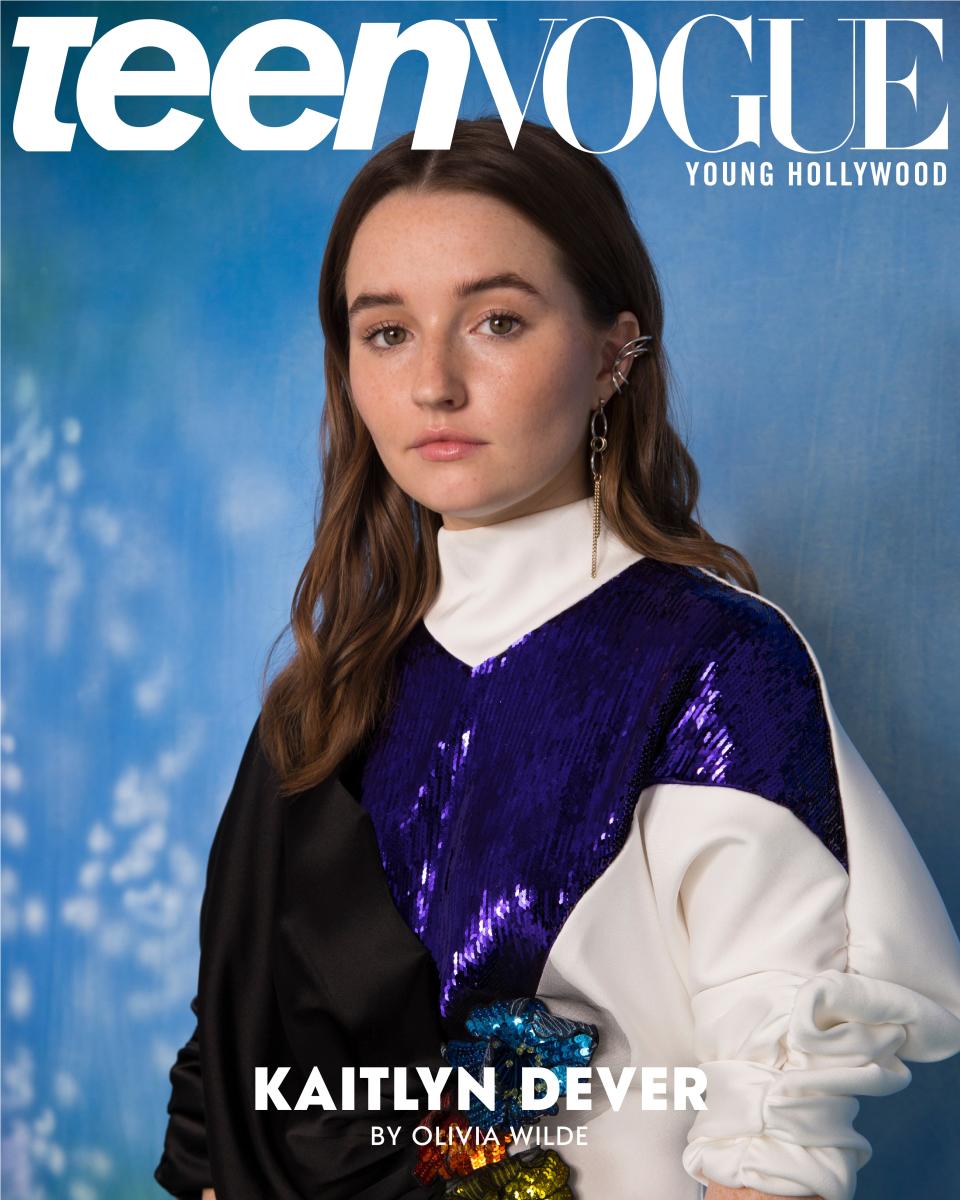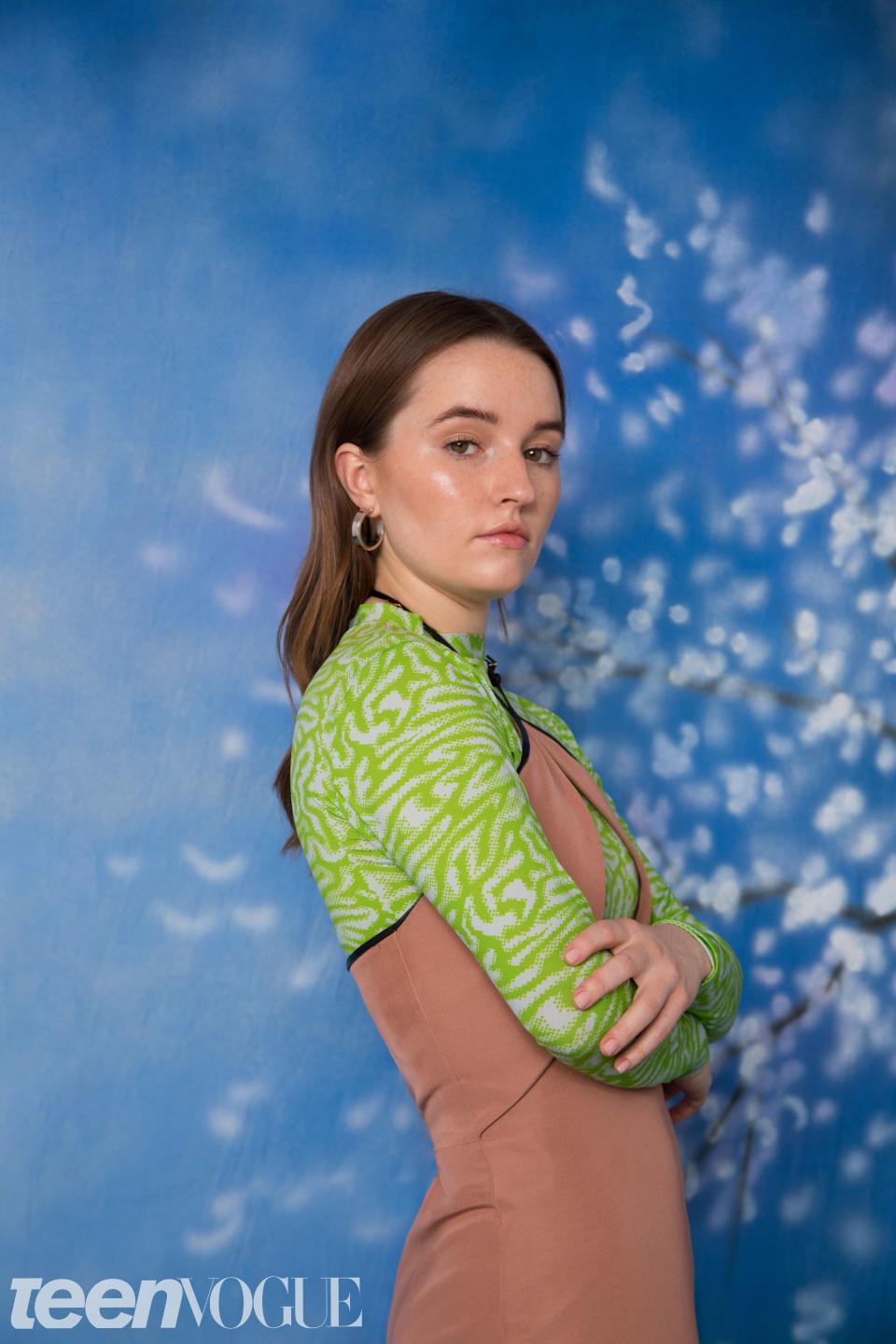Kaitlyn Dever Has the Range
Actor Kaitlyn Dever in conversation with director, producer, and actor Olivia Wilde
Over more than a decade of acting, Kaitlyn Dever has proven she has the range to take on characters in any genre and make them relatable, dynamic, and real. She presents characters as the kind of people who exist in our own lives. She treats comedies and dramas with the same commitment to nuance, showing the multifaceted aspects of every person she brings to life, whether it’s the firm-but-timid Amy in last year’s hit comedy Booksmart or the struggling, self-doubting Marie in Netflix’s based-on-a-true-story crime twist Unbelievable.
She’s transitioned smoothly from a Hollywood wunderkind, who first caught Booksmart director Olivia Wilde’s eye in the 2013 coming-of-age story Short Term 12, into a young actor making moves that reflect not only her tastes, but also her vision for what her career — and the entertainment industry — should look like. At a hotel in midtown Manhattan, Kaitlyn sat down with Olivia to unpack her wildly successful year, what motivates her acting choices, and why it’s so important for her to keep telling stories that haven’t been told before. — P. Claire Dodson

Olivia Wilde: There are so many interesting actresses making interesting choices, seemingly doing so with a lot of independence and intention. I see that as a shift from what I experienced in my early twenties in Hollywood, [where] I found it to be a lot harder to make choices that really separated me from the herd because there was so much pressure to join the herd to be relevant. You've been acting since you were 10 years old, you have seen the business evolve, and you have grown up within it. I'm curious how you go about making your choices.
Kaitlyn Dever: I've definitely seen a shift…. It's interesting, as I get older, I'm sort of realizing the voice I have in choices that I make; and also once we're on set, my voice, I think, has become more valued. I don't know if that's because of how the industry is changing for women, or also combined with the fact that I'm just literally getting older.
OW: I first discovered you in Short Term 12, and you were 14. To know that you are capable even at that young age, to create that character, to be able to do what you did in that film and also have the range to do what you do in Booksmart, and the same year to do it in Unbelievable — that range is so rare. How intentional is your process of choosing things that showcase the different parts of your range?
KD: The choices that I've made, especially in the past couple of years, I really want something that feels real to me. I really want something that immediately feels like young women that I'm surrounded by in my life and what feels true to me. I want to play strong women. I want to play roles that I see young men doing.
OW: Have you seen yourself represented onscreen? Do you feel like you watch content that feels representative of the type of woman you are?
KD: Not in the past, no, not the films that I grew up on.
OW: Right, you saw it in male characters.
KD: I saw [myself] in male characters. I always think back to Anthony Michael Hall in Weird Science — that was the one person I could relate to. And maybe characters like Lizzie McGuire, but even then those were sort of like dreamy versions of what women are.
OW: I always found that the only roles that felt like they allowed for complexity in women were the manic pixie dream girls. You were either oversexualized or you were quirky and complicated and adorable.
KD: You always had to be a klutz. I was always seeing women mess up all the time.
OW: One thing I admire about you is how devoted you are to your relationships with your parents and your sisters. This is a business that requires a lot of selfishness and missing family things. I'm curious, in terms of your close relationships with your family, how do you manage your closeness with your family and friends and what is inherently a solo job?
KD: I'm learning more and more how isolating it can feel and how many people I can be surrounded by and yet still feel lonely. I'm in a hotel room by myself in some strange city, and I'm used to being so close with my family. But I'm so grateful for that, because there's a lot that I'm discovering about myself — the way I am in the world and the way I interact with people. It's actually a really helpful way to discover how I live outside of my parents' home. I mean, obviously, I love doing interviews and press and red carpets and dressing up. It's all very fancy, and it feels like an added fun thing that we get to do, and I enjoy it a lot. But the moments that I feel at peace, the most content, are when I'm at home having dinner with my family, and then literally, like, doing a scene on set.

OW: [Your experience], by the way, disproves a common opinion or rumor about child actors. Why do you think your experience was different from what a lot of people experience when they start so young?
KD: My parents were extremely, extremely, extremely realistic. They always said, “All right, well, we're going to let you explore this. We're going to support you every step of the way, but you have to know that this is really not going to be easy and you're probably not going to book anything. And that's fine, you tried it, no pressure.” They're always telling me the truth. I know that I can go to my parents for anything in my life and know that, yes, maybe I'm not going to like the answer, but I know they're going to be right, deep down.
OW: Do you feel a certain kinship with other actors who started young? Does it feel like a little bit of a club?
KD: It does feel like a little bit of a club. It’s gotten way more inclusive. I grew up thinking that you couldn't talk to the other people in the auditions. But acting is not like an Olympic sport. It's not something that you can train harder for and run faster than someone else. It's literally just, you get things because you get things. I've grown a lot in my perspective over the years too, both from growing up in Texas, and then my mom was diagnosed with stage four breast cancer when I was 12, and that happened for a big chunk of my formative years. When a tragedy happens in your family, when something traumatic happens in your life at an early age, I think that it really allows you to step back and go, “Okay, what really matters here?”
OW: One of the reasons I'm so proud of Booksmart is [the depiction of] all the different women and how defined their characters are. Do you think of you and Beanie [Feldstein] as holding equal space in the film? You guys are both submitted for awards as Best Actress, and whenever I see that I get kind of emotional. Because I'm like, “This is how it can be,” yet there's always been this suggestion that women succeed based on the destruction of the other.
KD: It was so rare to have a scene partner where you share the same passion with that actor. I think it makes all the difference. [Beanie and I] both knew immediately, from the moment we met, that there is no Amy without Molly, and there's no Molly without Amy.
OW: You and I are both people who have played queer characters while living our day-to-day lives currently as straight. I think a lot about this because women would come up to me and be like, “Your character really helped me come out.” It feels like a real honor. I'm curious about how that experience has been for you.
KD: When people come up to me about how Amy has helped them or how grateful they are that Amy is being showcased in a movie like Booksmart, it makes me want to cry. It's amazing that I get to do that with my craft and my art. One time, there was a journalist I was talking to on our press tour, and she just thanked me for giving Amy life; she told me that she grew up in Michigan, in a small town, and she had to seek out that kind of representation, and she was very grateful that a character like Amy in Booksmart is [being seen by a lot of people].
OW: Okay, one big question. I recently had the chance to interview Nancy Pelosi, and she said something that really struck me [when] I asked her if this influx of women in Congress had changed the discourse in Congress: She said women arrived and immediately were very effective because they knew their “why.” So within this work, this job, do you know your “why”?
KD: I've realized as I've gotten older, and I've been able to be part of projects that have been very important for a lot of people, that I love to be part of telling stories that were somewhat buried; telling stories that deserve to be told. Being part of a movie like Booksmart is something so important for a young generation, being a part of a project like Unbelievable and discussing sexual assault in a way that we haven't seen it before, on a platform like Netflix — that kind of thing is something that I want to do more and more of. I love acting so much and it feels good to do it, but if I can do that and be part of something bigger, I don't know what else I need in life really.
Meet the rest of Teen Vogue's Young Hollywood Class of 2020.
Stylist: Chris Horan (@chrishoran20)
Makeup Artist: Lottie using TYNT Beauty (@lotstar)
Hair Stylist: Lauren Palmer Smith using Shu Uemura (@laurenpalmersmith)
Manicurists: Jacqueline Yekikan (@nails_by_jacqueline), Merrick Fisher (@merricures)
Set: Justin Fry (@jebuz)
Let us slide into your DMs. Sign up for the Teen Vogue daily email.
Want more from Teen Vogue? Check this out: Meet Teen Vogue's Young Hollywood Class of 2019
Originally Appeared on Teen Vogue

